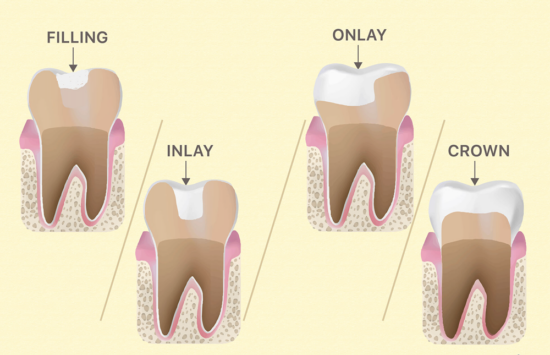
Treating a decayed tooth in a timely fashion is important. Otherwise, the damage can worsen with the decay compromising the tooth’s pulp, where nerves and blood vessels are located, in addition to structural injury.
The degree of decay and the location of the tooth can determine what form of treatment is best. Fortunately, there are a number of options that your dentist in Millwoods can recommend. Each one is advantageous in unique ways, and the subsequent prosthetics that are provided to preserve your teeth are tailored to meet your oral health requirements and aesthetic preferences.
If you’re interested in learning more about restorative dental measures, we encourage you to call our local dental centre.
What are Cavities?
Cavities, sometimes referred to as caries, are formed when plaque (a sticky film) forms on the hard surfaces of your teeth. The acidic bacteria found within this debris erodes the tooth’s protective enamel layer in a process that’s known as demineralization. When the debris is left unattended, it creates holes directly in the tooth itself, which leads to sensitivity, pain, and, in more serious cases, infections and gum disease.
This is a common dental issue for patients of every age and can occur due to a lack of good hygiene practices, consuming a lot of sugary foods, and infrequent dental visits. However, if a cavity is caught early enough, it can be effectively addressed, and the strength of your smile can be restored.
If you or a family member are dealing with cavities, please reach out to a dentist near you. Through a physical evaluation and x-rays, they can identify the most appropriate treatment to remedy your tooth and help boost your dental health.
What Options are Available to Treat Tooth Decay?
Once your teeth are examined, your dentist can advise acquiring one of several restorative treatments. Some of the most popular and most effective options include the following:
-
Dental Fillings
As the name of the service literally indicates, a dental filling is a specific type of material that fills in the holes in your tooth. It reinforces the tooth’s structural integrity, allowing you to bite and chew without issue.
Several materials can be applied to your tooth, with amalgam and composite resin fillings being two of the most popular. Most dental clinics are opting not to offer the former because of the presence of mercury in amalgam. However, some of our patients still request amalgam fillings. At Agape, we do offer it to the patient with full disclosure of potential risks. Many patients chose composite fillings because of their look and durable. Designed to blend in with your tooth, they are made of a plastic substance called acrylic resin that is reinforced with powdered glass quartz, silica, or other ceramic particles. Ceramic and glass ionomer fillings are additional options as well.
-
Dental Inlays and Onlays
Inlays and onlays in Millwoods are an excellent alternative if the amount of decay your tooth has sustained is too large for a conventional filling but not serious enough for a crown. These structures are fabricated in a laboratory and are customized to satisfy the dimensions of your tooth.
A dental inlay is applied within or inside the cusps of a tooth. Minor to moderate-sized areas of damage can be remedied with this prosthetic. In comparison, an onlay (or a partial crown) is covers most of the tooth and is bonder over or onto the tooth.
Materials like composite resin and ceramic can also be used to fabricate these structures. They provide reliable protection against future decay and can withstand the repetitive forces involved in eating. Unlike traditional fillings, inlays and onlays require at least two visits to place.
What is the Treatment Process Like?
The process of acquiring dental fillings, inlays, or onlays is quite similar in many aspects. The first step is visiting your general dentist so they can assess your situation and determine the amount of care needed to get your smile back to functioning normally.
-
Dental Fillings
If you’ve been approved for a filling, your dentist will administer local anesthesia, a medication that numbs the area. Every bit of the decay will be cleaned away, and the space will be disinfected. The selected material is then applied to your tooth. If you’re receiving a tooth-coloured filling, a curing light is used to help it harden. Last, your tooth is shaped and polished. Your dentist will ensure the new filling does not impact your bite pattern.
This treatment can be done in a single appointment.
-
Dental Inlays and Onlays
When you’re given the green light for an inlay or onlay, impressions of your tooth are made; this information guides lab technicians as they design your prosthetic, ensuring that it meets your needs. Physical molds or 3D images can be used to create these impressions. It can take a couple of weeks until the prosthetics are ready; a temporary filling may be provided to protect the tooth while you wait.
The inlay or onlay are bonded in place during a follow-up session. Your bite pattern will also be assessed before you go.
Have questions about either one of these services? Don’t be afraid to let your dental team know!
Consult with Our Dentists
By prioritizing the health of your smile daily, your treatment results can last for years. At Agape Dental, we are passionate about providing optimal dental care to all our patients. Don’t let cavities ruin your smile! If you’re looking to obtain dental fillings near you, inlays, onlays, crowns, or another form of care, contact us today. We look forward to seeing you and helping your smile shine.

